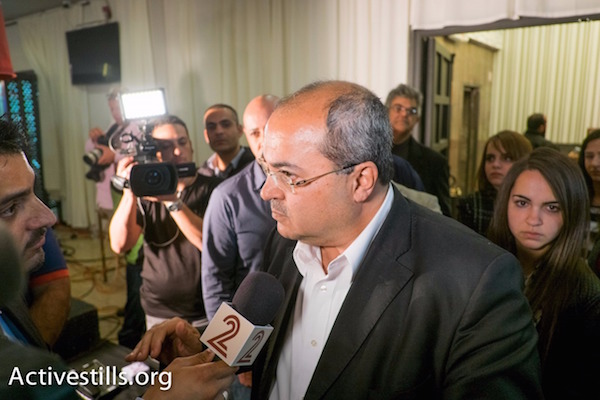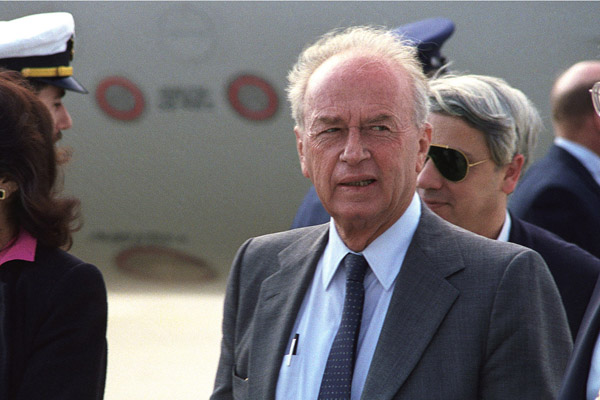By advancing legislation to exclude the Arab minority from the Knesset, Israel is showing the world that its political system is really only intended for one group.
By Marzouq El-Halabi

The so-called “suspension bill,” which passed its first reading in the Knesset several weeks ago, constitutes another step by the Israeli Right to exclude Arab representatives from Israeli politics. The bill, which gives the Knesset the authority to temporarily or permanently suspend elected members, stems not from a worry over the fate of Israel’s democracy, but is part of the Right’s slow effort to maliciously and intentionally harm it. The ultimate goal of the bill goes unspoken, although it is clear to all: to remove the Arab electorate from the political game in order to ensure the Right’s reign in the near future.
That strategy began even before the right-wing parties marked Arabs in Israel as the targets of a well-orchestrated delegitimization campaign. There is not a single leader on the Right who has not tried his hand, whether through incitement, anti-democratic bills — some of which passed — or targeting specific Arab MKs in the Knesset. A racist public discourse that besmirches the Arab minority as a “suspicious group” that is always “at fault.” My presumption is that this incitement is organized, even if it comes from different political parties.
From cooperation to exclusion
After the Right failed, at least temporarily, to exclude the Arabs by raising the election threshold, it attempted to put pressure on the Arab minority and its representatives. Unfortunately, many media outlets cooperated with the Right’s mission, even so far as strengthening the attacks against the Arab minority and its representatives. When the atmosphere grew tense due to violent attacks by individual Palestinians, the Right struck again, this time by outlawing the Northern Branch of the Islamic Movement. The Islamic Movement may have been the target, but the goal was to create an atmosphere in which the entire Arab public is removed from the political sphere. Now it seems that the Right has marked the representatives of the nationalist Balad party, and any other Arab representative that does not dance to the tune of Bennett or Netanyahu.
The process is clear. The point is to drive a wedge between the Arab minority as a significant electorate power and the opposing right-wing camp. Let us remember that it was the Arab members of Knesset who provided a political safety net for Prime Minister Yitzhak Rabin in the 90s. This kind of scenario could repeat itself, which is exactly what the Right is trying to prevent by removing the Arab minority from the political game.

The establishment’s attitude since the founding of the state has been to include the Arab minority in the political game, and to encourage Arab citizens to participate in elections. Those who held this view believed that the participation of the Palestinians who remained in their homeland would give the nascent state a seal of approval, and would only strengthen its legitimacy in the eyes of the world. The legal attitude was much the same: aside from the “Al-Ard ruling” in the 1960s, Israel’s Supreme Court has tended to allow Arab parties who had been disqualified by the Central Elections Committee from participating in elections. The Right, which has failed at disqualifying Arab parties and leaders, is attempting to pass legislation that would allow it to do so.
And if they succeed? What then?
This move is not surprising since those behind it are right-wing ideologues who prefer the nation and religion over the state. What is surprising is the political camp that positions itself as an alternative to right-wing rule, the one which praises itself for protecting democracy. Instead of fighting for democracy and proper representative for Arabs, this camp turns a cold shoulder to them. This camp seems to enjoy taking part in the delegitimization of the Arab minority in Israel (see MK Avi Dichter’s speech targeting Joint List Chairman Ayman Odeh). This kind of discourse leaves little room for doubt that even the “enlightened” camp, which “fights for democracy” does not intend to include Arabs in its democracy.

Let’s imagine that Arabs are finally excluded from the Knesset, and that the number of Arab citizens who vote starts to dwindle — whether due to more anti-democratic legislation or as a response to the Right’s policies. That is precisely when the world will start to suspect that the regime in Israel is an apartheid regime that has come out of the closet. If the political game between the river and the sea becomes designated for one nation alone, the result will be that the Right in Israel will have succeeded in turning Israel into an apartheid state. There is no other name for this kind of rule. The problem is that we are already at the peak of this process.
Marzouq El-Halabi is an attorney, journalist, and author. He writes a regular column in the London-based Al-Hayat daily newspaper. This article was first published in Hebrew on Local Call. Read it here.

